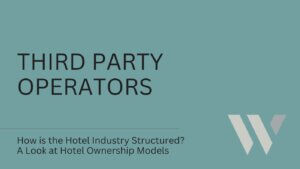The hotel industry is highly diverse, with properties ranging from small, family-owned B&Bs to large, luxury resort complexes. It should come as no surprise, then, that there are varying ownership and management models that are more applicable to one type of property vs. another. These models will often depend on the preferences and resources of the property owners, investors, and hotel operators.
The hotel industry generally consists of the owner, operator, and/or franchise. We look at each of these three hotel structures below.
Join the waitlist for our next investment opportunity and learn more about our unique approach to hotel investing.
Hotel Owners
Hotel owners are typically investors who have purchased the land, building, and all of the FF&E (furniture, fixtures and equipment) inside of the hotel property. The role of the hotel operator will then depend on whether the owner wants to pursue a franchise or whether they intend to be an owner-operator.
 Owner-Operator:
Owner-Operator:
In this model, the property is both owned and operated by the same entity or individual. The owner is directly responsible for all aspects of the hotel’s operation, including management, staffing, marketing, and maintenance. Owner-operated hotels are common among small, independent properties, such as boutique hotels and bed and breakfasts. The more hotels an owner acquires, the less likely they will be to owner-operate. Typically, after someone has 2-3 hotels, they will begin to outsource management to a third-party operator.
Owner-operators can operate both independent hotels as well as franchises. Those who want to retain full control and autonomy, as well as maximize their potential profitability, may look to operate the hotel independently of any hotel chain. However, those looking for more support (especially those with less hotel experience), may find the franchise model to be more compelling.
About 50-60% of limited-service hotels are run by owner-operators; the other half are run by third-party operators (see below). Five-star hotels, which we’ll discuss in more detail below, can never be run using this owner-operator structure.
 Third-Party Operators
Third-Party Operators
Third-party operators operate on a management contract model, where the property owner contracts with the third-party company to operate the hotel on their behalf. The management company will oversee day-to-day operations, staffing, marketing, and overall management in exchange for a fee – often a percentage of revenue.
For example, a management company may earn a 3% fee on all top-line room revenue. This ensures the operator is incentivized, at least, to drive room revenue. The harder the operator works to increase the hotel’s revenues, the more money they stand to earn.
Owners should think carefully about who they use as a third-party operator, how that operator is incentivized, what the bonus structure looks like, and what kind of approval rights they will grant to the operator to act on their behalf.
Many boutique hotels are run by third-party management companies.
 Franchises
Franchises
The franchise structure is arguably the most common hotel management structure. Franchise hotels are independently owned properties that enter into a franchise agreement with established hotel chains or brands. Franchise agreements are typically 15-20 years long.
Hotel owners can expect to pay upwards of $150,000 or more in initial franchise fees. The application process can be lengthy, and it requires the owner to submit their personal financials and balance sheet to the franchisor.
Hilton and Marriott are two large hotel brands that utilize a franchise model. For example, an individual owner may apply to Hilton to secure a Hilton Garden Inn flag. They can then expect to pay Hilton, as the parent company, 8-10% of all top-line revenue on a monthly basis. In other words, if a hotel earns $1 million in revenue, then up to $100k of that will go to Hilton.
In exchange for the franchise fee, the franchisee gets various support from the parent company. First, they get the parent company’s name (e.g., Hilton) on their property and all their collateral. When someone goes to the Hilton.com website, their property will be listed there. The franchisor will also handle all back-end booking and marketing – two things that must be handled carefully to operate a successful hotel. The franchisee also gains access to the parent company’s rewards system, something that is attractive to many hotel guests.
Franchises also ensure that all their franchisees are keeping their hotels up to date with the brand standards. It is no different than what you would expect with fast food franchises. When you order a spicy chicken sandwich at McDonald’s in California, you expect it to be essentially the same as the one you would get in Florida. They taste basically the same because of McDonald’s standards.
It is the same thing in the hotel industry.
For example, someone can expect a Hilton Garden Inn to offer rooms with two queen beds, 55” TVs, a shower/tub combo, and continental breakfast regardless of whether they are booking a room in NYC or Phoenix, Arizona. Hilton ensures the same standards across their franchisees, with a requirement to refresh the rooms every 7 to 14 years. Hotels that do not maintain the brand standards risk losing their franchise license.
Franchised hotels can be either owner-operated or operated by third-party management companies.
How to Apply for a Hotel Franchise
Those who plan to operate a franchise will usually start by researching different hotel brands or chains to identify the one that aligns with their goals, budget, and the location of the property. The next step is to contact the franchisor and express interest in becoming a franchisee. Once that step is completed, the applicant will apply for the “flag” which requires showing the parent company that they are equipped to run the hotel to the brand standards. To that end, the franchisor will expect to see a comprehensive business plan that outlines the prospective franchisee’s financial resources and operational strategy.
The process also includes a background check and full financial audit. The brand may also require an in-person interview to assess an applicant’s suitability as a franchisee. An applicant should be prepared to discuss their business experience, goals, and commitment to the brand.
Finally, if the franchise application is approved, the franchisor will deliver a franchise agreement. If an agreement is struck, the franchisee will need to prepare for the franchisor’s training program which will teach the brand standards, operational procedures, marketing, and management systems.
Five-Star Hotels
There is a notable exception to the above, and it pertains to five-star hotels. Five-star hotels, regardless of the brand, will not allow owners or third-party firms to manage the property. The parent company will insist on managing those properties in-house.
Waldorf, for example, is managed by Hilton directly – both in the U.S. and overseas. Every Ritz-Carlton is managed by Marriott. Every Intercontinental hotel is managed by IHG. These parent companies simply do not allow any independent operation of their five-star properties.
Therefore, the role of an owner changes with five-star hotels. Rather than owner-operating or overseeing the management company, owners become more of an asset manager.
As an owner of a five-star property, controls generally falls into one of the following categories:
- CapEx approval: typically, the contract will stipulate a certain dollar value that the hotel parent company is allowed to spend without coming to the owner for approval. This way, when something like a refrigerator breaks and needs to be replaced immediately, there is no delay in doing so. The owner can require the hotel seek approval for any capital expense above a pre-determined threshold.
- Budget approval: The second lever an owner has is budget approval. The hotel operator may recommend an annual budget that the owner does not feel is sufficiently profitable. The owner can veto the budget or adjust the budget prior to the new fiscal year.
- Veto rights: Owners will also have veto rights for executives. The parent company cannot hire someone like a new general manager, marketing director, head of finance, or chief engineer without the owner’s approval. The operator can present one or more candidates and make a recommendation, but ultimately, the owner has the final say in who is hired for these critical management positions.
- Development: A final category is hotel development, including major value-add improvements such as adding additional hotel rooms or major hotel amenities. Development generally requires a significant capital injection, and therefore, this will typically involve a negotiation between the owner and the operator. The operator, for example, might suggest investing in a larger conference center if they feel like they are regularly losing business to a nearby property that can accommodate larger groups, for example.
Of course, the extent to which the owner retains control over these and other decisions will depend on the language in the management agreement – which can always be negotiated with the parent company/brand that will operate the hotel.
Join the waitlist for our next investment opportunity and learn more about our unique approach to hotel investing.
 Lease Agreements
Lease Agreements
An often-overlooked hotel structure is the lease agreement. In this model, the property owner leases the hotel to a lessee, who operates the hotel as their own business. The lessee pays rent to the property owner and is responsible for all aspects of hotel management. Lease agreements may be short-term or long-term, depending on the terms negotiated between the parties.
The primary draw to this structure is it allows the property owner to transfer all day-to-day operational responsibilities to the lessee or tenant while still earning stable, passive income. Leasing can also mitigate some of the operational and financial risks associated with hotel ownership, as the lessee assumes responsibility for revenue generation, thereby making the owner less susceptible to market fluctuations.
Conclusion
At Wolfgramm Capital, we owner-operate all but our five-star hotels. The choice of ownership and management model ultimately depends on factors such as the property’s size, location, market segment, investor preferences, and the level of expertise in hotel management. Each model has its advantages and challenges, and property owners and investors must carefully consider their goals and resources when selecting the most suitable model for their hotel.
Interested in learning more? Contact us today!



